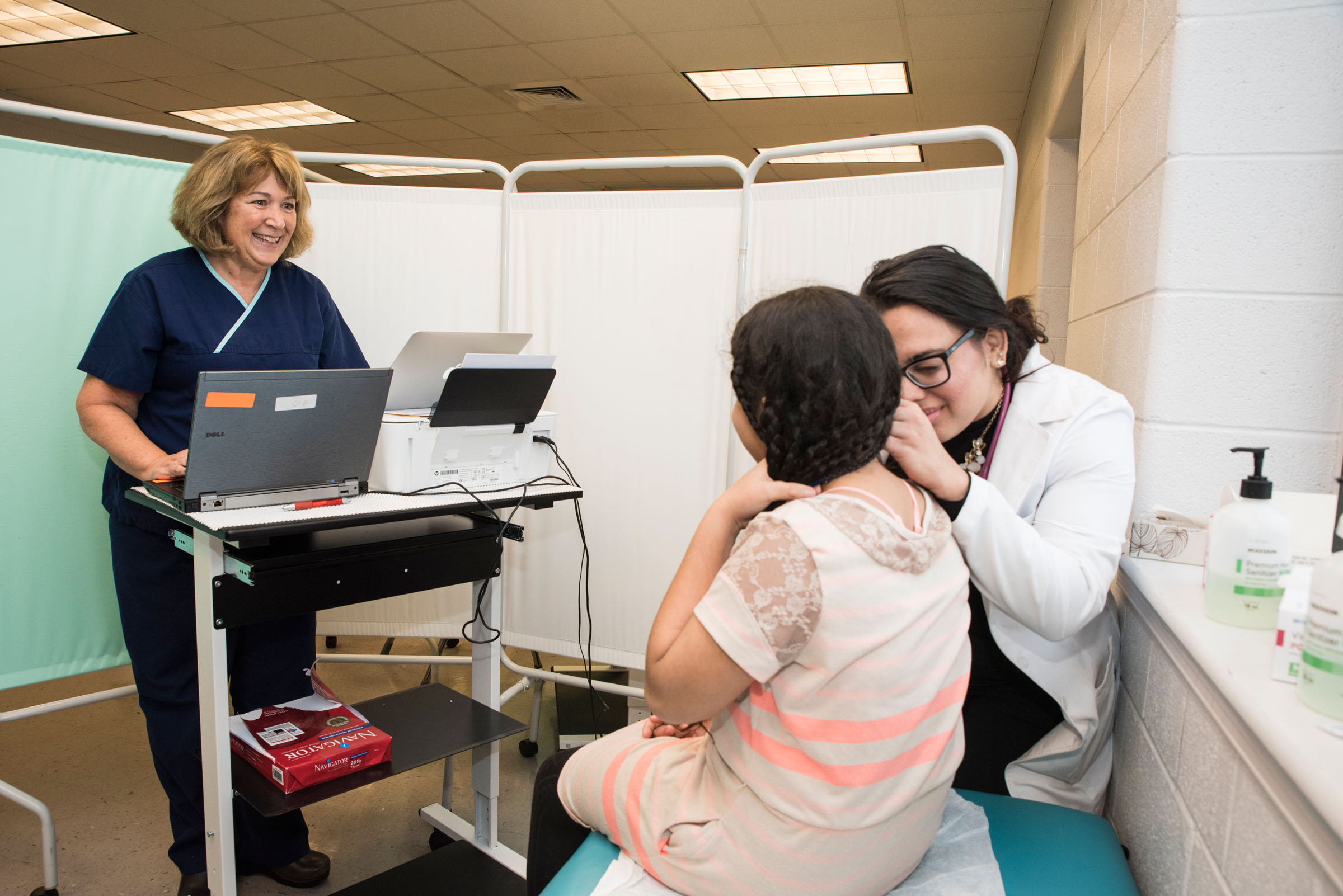
Cheryl A. Oetjen, assistant professor of nursing, supervises student Asra Amin at the Mason and Partners (MAP) clinic in Manassas Park. Thanks to a grant from the Potomac Health Foundation, the clinic is preparing to move to a more permanent home on the grounds of the Manassas Park Community Center in January. Photo by Ron Aira.
Peer into a cluster of bare rooms inside the Manassas Park Community Center, and you might have a hard time envisioning how the space transforms into a hub for the medical treatment of Virginia’s most vulnerable population.
Yet, once a week, faculty and students from George Mason University’s School of Nursing arrive at the center and carefully unpack a closet filled with basic medical equipment and a few supplies.
Within an hour, they’ve set up the nurse-managed Mason and Partners (MAP) clinic, and it’s buzzing with activity—patients have lined up to snag one of the 30 appointment timeslots for that day.
Nursing faculty members, working with their students, conduct health exams, treat mild rashes and ailments, refer patients to emergency rooms and provide follow-up care for chronic conditions. At the same time, community partners help to navigate access to the medical system and provide other community support.
Community health workers and clinic volunteers watch over children who line the hallway as well, passing the time with coloring books as they wait to be seen.
At the end of the day, the clinic’s supplies—privacy curtains, exam tables and all—are packed up into storage bins and then locked into closets for safekeeping. The closets also double as offices for clinic staff during the workday.
The clinics grew out of a need to provide physicals to students so they can attend school. “From the simple setup, we expanded to address the needs of these at-risk populations—their parents, chronic conditions, and behavioral health challenges,” said Rebecca Sutter, a George Mason professor of nursing and co-director of the clinic.
That’s how the MAP Clinic has operated since opening in 2013, but things are about to change.
A grant from the Potomac Health Foundation means the clinic will receive a permanent home inside a modular structure, scheduled to open in January on the community center campus.
“This structure expanded our ability to meet the needs of this HRSA-designated medically underserved population,” Sutter said. “We envision more than direct medical care and want to expand our impact by addressing social determinants of health and social service needs.”
In three years, the clinic has expanded to three full clinic locations, one in Manassas Park and two in medically underserved pockets in Falls Church and Springfield-Franconia. Additionally there are co-located extension sites in the the Prince William County Community Service Boards and one in the Prince William County Health Department. All these locations were strategically located in underserved areas where the clinics can collaborate to impact at-risk patients in collaboration with partners.
At present, more than 5,500 patients from 37 countries have been treated. The program provides $90,000 a month in unsubsidized health care to underserved populations through the three clinics combined, Sutter said.
With the new building, health management services for chronic conditions can be expanded. The primary goal is to educate the future workforce, as the MAP clinics serve as an academic clinical training site for students, Sutter said.
The clinics work in interprofessional teams from Mason’s Departments of Health Administration and Policy, Nutrition and Food Studies, Social Work, and Psychology and the School of Nursing.
“It’s an active learning lab. Really, it’s an opportunity for different students to work together,” Sutter said. “It’s like a dance, and everyone has to learn how to dance together.”
Working together with Mason’s partners—including the Prince William Health District, Fairfax County Neighborhood and Community Services, Alternative House, INTotal Health, Partnership for Healthier Kids, Anthem HealthKeepers and the Manassas Park Community Center—is an integral part of making the clinics successful, Sutter said, as they provide support in the way of resources.
“The value of the partnerships is that they address the health care needs of the most vulnerable members of society,”said Carol Urban, director of the School of Nursing.
